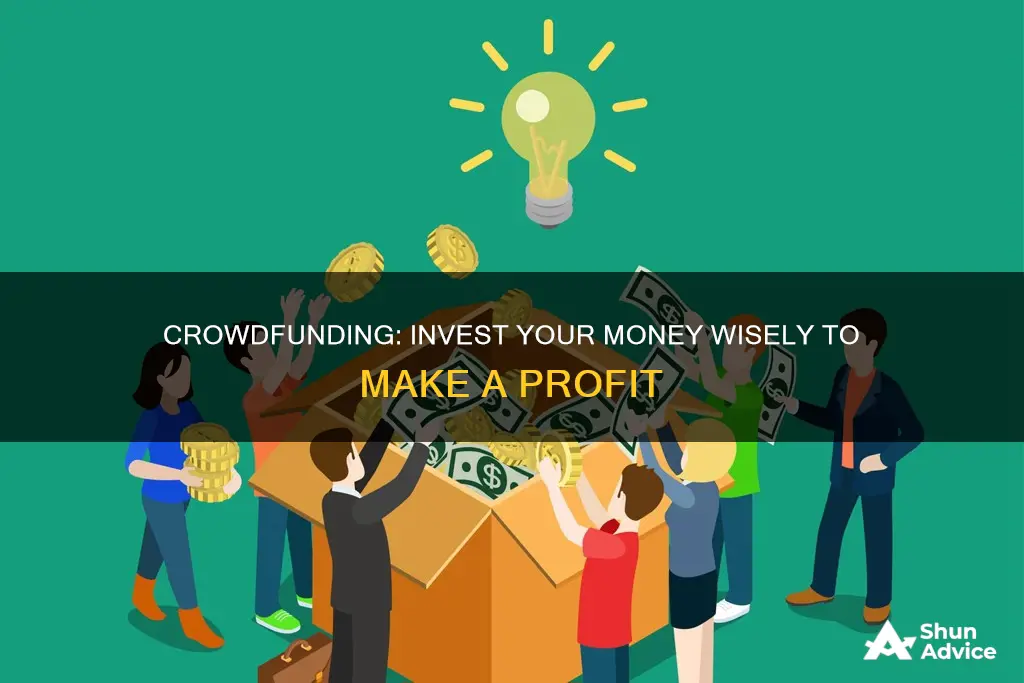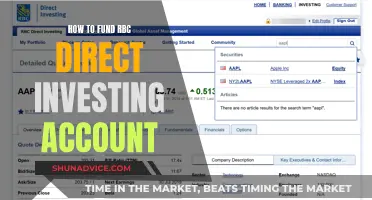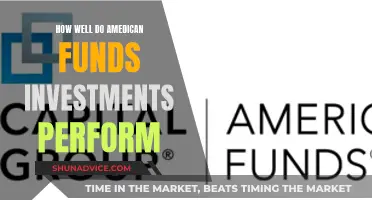
Crowdfunding is a way for businesses, charities, and individuals to raise capital without the need for bank loans or traditional sources of private equity. It is a public way of raising money from many people for a specific goal, usually online and through crowdfunding websites. There are different types of crowdfunding, but in equity crowdfunding, investors get a proportionate slice of equity in the business venture in exchange for cash. This type of crowdfunding is rapidly gaining popularity, with the global crowdfunding market valued at $12.27 billion in 2019 and expected to reach $25.8 billion by 2026. However, as with any investment, there are risks involved, and it's important to evaluate the situation before dedicating money to crowdfunding.
| Characteristics | Values |
|---|---|
| Type of crowdfunding | Equity-based, loan-based, rewards-based, donation-based |
| Amount to invest | As little as $100 |
| Investor status | Anyone |
| Returns | Dividends from annual profits, payouts in case of business acquisitions and IPOs |
| Risk | High |
| Tax benefits | EIS and SEIS tax reliefs |
What You'll Learn
- Understand the different types of crowdfunding: equity, rewards-based, and loan-based
- Evaluate the risks and potential for high returns
- Research crowdfunding platforms and their specific rules and regulations
- Learn about tax benefits and implications
- Consult an independent financial advisor to assess your risk tolerance and whether crowdfunding is right for you

Understand the different types of crowdfunding: equity, rewards-based, and loan-based
Understand the Different Types of Crowdfunding
There are several types of crowdfunding, each with its own unique characteristics, advantages, and use cases. The main types include reward-based, equity-based, and loan-based (debt-based) crowdfunding. Here's an overview of each type:
Reward-Based Crowdfunding
Reward-based crowdfunding involves individuals contributing to a business or project in exchange for a "reward." The reward is typically a form of the product or service that the company offers. This approach is often used by small businesses and creative projects as it allows them to incentivize contributors without incurring significant expenses or giving up ownership stakes. Rewards can vary from pre-orders of the product, to special services offered by the founders, to recognition or swag, such as a company t-shirt. While this method offers backers a reward, it's still generally considered a form of donation since there is no financial or equity return.
Equity-Based Crowdfunding
Equity-based crowdfunding, also known as crowd-investing or investment crowdfunding, allows contributors to become part-owners of a company by trading their capital for equity shares. In exchange for their investment, donors receive a percentage ownership in the company, along with the potential for financial returns. This type of crowdfunding is perfect for small to medium-sized companies seeking to raise a large amount of capital, typically sums higher than $50,000. It provides an opportunity for investors to own a small piece of a growing company. Startups with high growth potential often use equity crowdfunding to raise larger amounts of money by offering a stake in their future profits.
Loan-Based (Debt-Based) Crowdfunding
Loan-based crowdfunding, also known as peer-to-peer lending or P2P lending, is similar to a traditional loan. In this model, individuals or businesses raise funds from a crowd of investors, promising to pay them back with interest at a later date. It is often used by businesses that need capital but prefer to repay the funds rather than give out equity. This method allows businesses to access capital without taking on traditional loans or giving up ownership. The repayment schedule is usually fixed, providing a predictable expense for the business. However, it's important to note that there is an obligation to repay the loan, along with interest, regardless of the business's performance.
A Guide to Investing in the 10T Fund
You may want to see also

Evaluate the risks and potential for high returns
Risks
Equity crowdfunding carries several risks that you should be aware of before investing. Here are some of the key risks to consider:
- Risk of Failure: Businesses funded through equity crowdfunding may have a higher risk of failure compared to those backed by venture capital or other traditional means. This is because they may lack the support of seasoned professionals who can help steer them through early development challenges.
- Time to Materialize: Returns on equity crowdfunding ventures may take a long time to materialize, if they happen at all. There is a chance that management may deviate from the business plan or face difficulties in scaling the business, leading to capital erosion instead of wealth creation.
- Security: Crowdfunding portals and platforms are vulnerable to attacks from hackers and cyber-criminals, which could result in the theft of personal and financial information.
- Lower-Quality Investments: There is a possibility that companies resorting to equity crowdfunding were unable to attract funding from conventional sources, such as angel investors and venture capitalists. This could indicate that these businesses have limited growth potential and are therefore riskier investments.
- Dilution: As a crowdfund investor, your ownership percentage in the company may decrease if the company issues additional shares in the future.
- Lack of Liquidity: Crowdfunded shares typically cannot be easily resold, and investors may not be able to withdraw their investments before a liquidation event. This lack of liquidity means that your funds may be tied up in the company for years, and you may not be able to resell your shares until the company goes public (which may never happen).
- Fraud: The very features that make crowdfunding convenient and accessible (wide reach, scalability, etc.) also make it easier for scammers to set up dubious ventures to attract naive investors.
Potential for High Returns
While equity crowdfunding comes with significant risks, it also offers the potential for substantial financial gains. Here are some of the reasons why it may be a lucrative investment option:
- High-Growth Potential: Since the risks are high, the potential for large returns is also elevated. In the case of Oculus Rift, a virtual reality headset maker that was crowdfunded through Kickstarter, an investment of $250 could have resulted in proceeds of $36,000 to $50,000 if the investors had owned equity in the company when it was acquired by Facebook for $2 billion.
- Diversification: Equity crowdfunding allows investors to diversify their portfolios by investing smaller amounts across various industries, such as startups, real estate, and private equity. This diversification can help balance the risks associated with crowdfunding while still providing the opportunity for high returns.
- Level Playing Field: Equity crowdfunding has democratized investing by allowing non-accredited investors to participate in early-stage, high-risk, high-reward ventures that were previously only accessible to high net-worth individuals. This levels the playing field and gives everyone a chance to invest in the next big idea.
- Job Creation and Business Growth: Small and medium-sized businesses are significant beneficiaries of equity crowdfunding, as it provides them with easier access to capital. This translates into the formation of new businesses, job creation, and a boost to the local and national economies. As an investor, you can feel good about contributing to this positive impact while also potentially profiting from it.
- Personal Satisfaction: Equity crowdfunding allows investors to choose businesses or ideas that resonate with them, aligning with their values or interests. This personal connection can lead to a greater degree of satisfaction, even if the financial returns take time to materialize.
Woodson Funds: A Guide to Investing Wisely
You may want to see also

Research crowdfunding platforms and their specific rules and regulations
The Jumpstart Our Business Startups (JOBS) Act of 2012 created the regulatory system for companies to find investors through crowdfunding sites. The Act required the Securities and Exchange Commission (SEC) to devise rules for investment crowdfunding, allowing startups and small- and medium-sized businesses to raise capital without the usual red tape that comes with issuing shares and returns for stakeholders.
In the United States, all regulated crowdfunding transactions must take place online through an SEC-registered intermediary, either a broker-dealer or a funding portal. To invest, a potential investor must open an account with a crowdfunding intermediary. All written communications relating to that crowdfunding investment must be electronically delivered.
There are rules around how much money can be raised and how much can be invested. Regulation Crowdfunding permits a company to raise a maximum of $5 million through crowdfunding in a 12-month period. The amount individual non-accredited investors can invest across all crowdfunding offerings in a 12-month period is limited and depends on their net worth and annual income.
For investors with an annual income or net worth of less than $124,000, they can invest $2,500 or up to 5% of the greater figure between their income and net worth. Investors with an annual income or net worth of more than $124,000 can invest 10% of the greater figure between their income and net worth, up to a maximum of $124,000.
Securities purchased through crowdfunding cannot generally be resold for one year.
It is important to note that each crowdfunding platform will have its own specific rules and nuances, so be sure to do your research before choosing a platform.
Mutual Fund Investing: Cutting Out the Middleman
You may want to see also

Learn about tax benefits and implications
Money raised through crowdfunding may be taxable, so it's important to understand the tax benefits and implications of investing in crowdfunding.
If you are a crowdfunding organiser, the money raised may not be included in your gross income as long as you give the money to the person or business for whom you organised the campaign. If you are donating to a crowdfunding campaign out of generosity and without expecting anything in return, your donations are considered gifts and are not included in the gross income of the recipient. However, not all contributions are gifts and may be taxable. For example, if an employer contributes to a crowdfunding campaign for an employee, those contributions are generally included in the employee's gross income.
If you are a backer in an equity crowdfunding scheme, you become a holder of ownership rights by purchasing a company's shares and can expect returns on your investments if the business goes public or gets acquired. In this case, you may qualify for favourable tax treatment under Sec. 1202 qualified small business stock rules or the Sec. 1244 small business corporation rules. If the company you invested in fails, you may be able to claim a worthless security loss under Sec. 165(g).
On the other hand, if you are a backer in a peer-to-peer lending model, you act as a lender providing money to businesses in return for fixed interest payments. In this case, the tax implications may differ, and you should consult a tax professional for advice.
Additionally, keep in mind that the tax treatment of crowdfunding investments may vary depending on the financial state of the company when the stock was issued. For example, some investments may be treated as qualified small business (QSB) stock, which offers preferential treatment of gains on the sale of the stock under Sec. 1202. To qualify as QSB stock, the company must meet certain requirements, such as having never had gross assets in excess of $50 million.
It's important to consult a trusted tax professional to understand the specific tax implications of your crowdfunding investments and how to treat amounts received from campaigns.
Mutual Fund Strategies: Closed Funds for Savvy Investors
You may want to see also

Consult an independent financial advisor to assess your risk tolerance and whether crowdfunding is right for you
Before investing in crowdfunding, it is important to consult an independent financial advisor to assess your risk tolerance and whether this type of investment is suitable for you.
Crowdfunding carries significant financial risks, and it is important to understand these before committing your money. While it can be a rewarding venture, it is a relatively new concept and it is important to be aware of the potential pitfalls.
An independent financial advisor will be able to give you an honest, professional opinion on whether crowdfunding is a good option for you. They will take into account your financial situation, your risk tolerance, and your investment goals, and advise you accordingly.
For example, if you are risk-averse, crowdfunding may not be the best option for you. It often involves investing in new, unproven businesses, so it can be a gamble. These types of investments are often driven more by people's optimism and passion for a project than by investment strategy. It is also important to note that your money will not be protected by the Financial Services Compensation Scheme, so if the business or project fails, you may lose your investment without any compensation.
Additionally, crowdfunding platforms themselves can go bust, and there is no guarantee that the money you invest will be used for the stated purpose. It is also worth noting that the quality of investment opportunities may be lower, as more conventional funding sources (such as angel investors and venture capitalists) may have passed them over.
On the other hand, if you have a high-risk tolerance and are interested in supporting new businesses and innovative ideas, crowdfunding may be a good fit. It can offer the potential for high returns and the opportunity to invest in businesses that resonate with you and your values.
A financial advisor will be able to help you weigh these risks and rewards and make an informed decision about whether crowdfunding is right for you. They can also guide you in constructing a balanced investment portfolio that aligns with your goals and risk tolerance.
A Smart Guide to Investing in Pag-IBIG Fund
You may want to see also
Frequently asked questions
Crowdfunding is a way for businesses, charities, and individuals to raise capital without the need for bank loans or traditional sources of private equity. It is usually done online, through crowdfunding websites, where people can contribute small amounts of money to a specific goal or project.
There are three main types of crowdfunding: equity or investment-based crowdfunding, rewards-based crowdfunding, and loan-based crowdfunding (also known as peer-to-peer or P2P funding). In equity crowdfunding, investors receive equity in the business, typically in proportion to their investment. Rewards-based crowdfunding offers investors rewards or perks linked to the project, such as free products or symbolic gestures. Loan-based crowdfunding involves lending money to businesses indirectly through P2P platforms, with more generous interest rates than traditional banks.
As with any investment, there are financial risks involved in crowdfunding. The biggest risk is losing your money if the business or venture fails. Crowdfunding is considered high-risk, with a greater chance of both significant gains and significant losses. It often involves new and unproven businesses, so it can be a gamble. However, the potential reward is also high, with the possibility of huge returns on successful investments. Crowdfunding also offers tax benefits, such as the Enterprise Investment Scheme and the Seed Enterprise Investment Scheme, which allow investors to claim tax relief on a percentage of their investment.
If you're interested in investing through crowdfunding, follow these steps: decide which type of crowdfunding you want to invest in (equity, loan, or rewards-based), choose a specific business or product to invest in by researching crowdfunding platforms, conduct thorough due diligence on the project, and consult with a financial advisor to ensure it aligns with your risk appetite and investment goals.
Some well-known brands that have successfully used crowdfunding include Monzo, BrewDog, and PopSockets. Monzo raised £1 million in just 96 seconds on Crowdcube in 2016, and their shares rose 25 times in value by 2019. Camden Town Brewery is another example, raising £2.75 million on Crowdcube before being acquired by Anheuser-Busch InBev for a rumoured £85 million.







